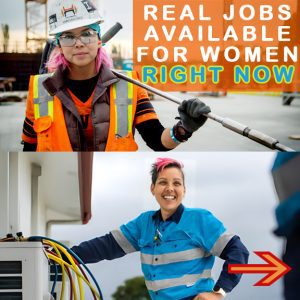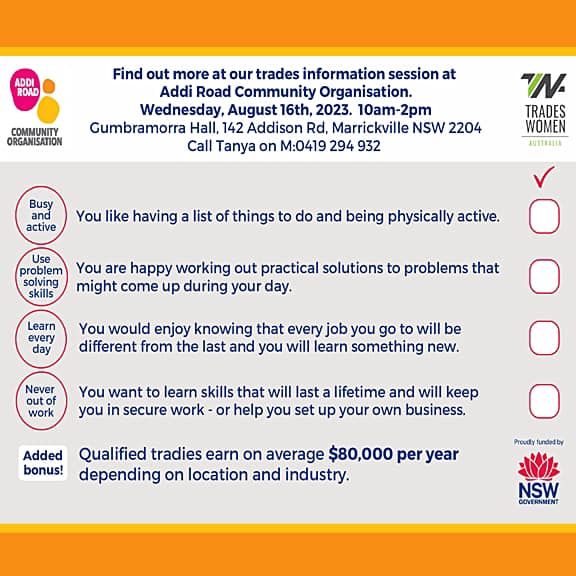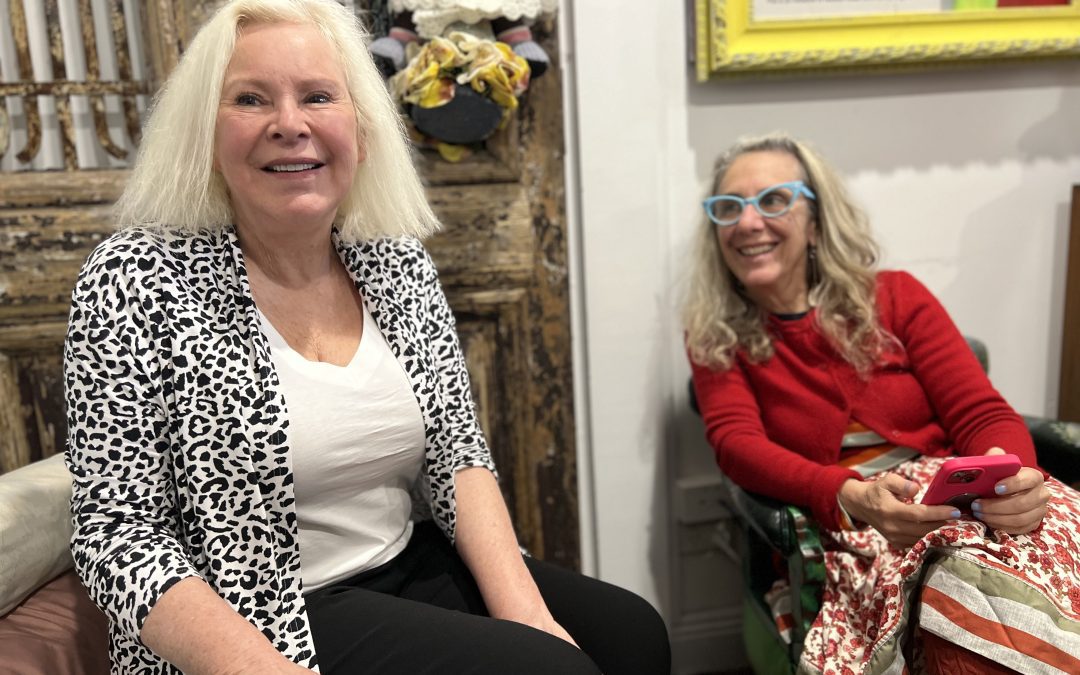Tanya Paterson is the Workplace Diversity Officer for Tradeswomen Australia. Their website neatly sums up her job and the bigger role that her organisation plays: “We’re working to educate, encourage, recruit, and retain more women in trade careers. We raise community awareness as well as educate and support women who may be in vulnerable situations to transition to financial and life security. We do this through encouraging them into trade pathways and then careers, by connecting them to trades employers.”
There’s so much possibility it’s a little maddening to Tanya that she has to work so hard to get the message out there to the wider public. Opportunities are going begging.
“There is a massive skills shortage in NSW,” Tanya explains. They’ve been having the same problems in Tasmania, which is more usually home-base for her before she was called north recently to help out in Sydney after having some serious successes in getting women into the construction industry in Hobart.
“Unfortunately, there’s this image is stuck in people’s heads where when you talk about tradies they picture this bloke with a hard hat, protective glasses and a hi-vis vest,’ she says. “But that is not the case anymore. The trades are absolutely screaming out for people. How can they fix that? It’s obvious. With women you can double the workforce potential. They’re begging for women to become part of things.”
On Wednesday 16 August, Tanya will lead a Tradeswomen Australia Information Day from 10am to 2pm in collaboration with Addi Road at our Gumbramorra Hall here in Marrickville.
For those who get interested, it will be followed one week later on Wednesday and Thursday, 23 and 24 August, with a more hands-on introduction, including a site visit, “an afternoon on Makita power tools” she laughs, and sessions with Master Builders, trade brokers and others to give a more realistic picture as well as a taste of things.
“But that first Information Day is just to let women know what is possible. For women of all ages,” she emphasises, “to come and talk and see what they might be able to do”.

Apprentices usually begin on modest wages and learn on-the-job and or study part-time at TAFE “but their wages go up pretty quickly,” she says. Tanya is adamant and excited about what that means. “Stable jobs for women. Good money. And your skills are portable, so you can take them with you and pretty much get work anywhere.”
She gives an example off-the-cuff. “Right now, Sydney Trains has 60 apprenticeships on offer and they want women to take them up. When you’re fully qualified it will mean wages in the vicinity of 80-100k.” She repeats this news again. “They want women in those jobs.”
Tanya also emphasises that Tradeswomen Australia don’t place women randomly in occupations or work places that are not amenable to their ambitions. “One thing we really care about is placing people where the culture is safe. We’re all about the culture. So we do courses in what we call ‘by-stander action’ for workplaces, where we teach businesses and male workers how to say ‘cut it out’ and how to help resist the pack mentality, the toxic masculinity that can be a problem.”
“We also teach the employment recruiters about ‘unconscious bias’ so they are more open to women trainees and apprentices and understand what is possible, all the benefits they can get, which ultimately opening up the same diverse possibilities to gay people, ethnic groups, everyone who is capable.”
One of the most vital aspects for Tanya is making sure Tradeswomen Australia “creates strong pathways for working class girls. There’s a big issue around intergenerational unemployment in certain areas. If we help young women in those situations we can change the lives of everyone and break that cycle of poverty and unemployment. It’s not rocket science. Just like boys, a lot of girls are not especially good at school or academically inclined. But they are not given the opportunities – or chance to even see what other possibilities – might be there.”
Tanya urges women to come along on 16 August to Addi Road find more. “We really want older women to think about it too. There are retraining possibilities, for sure. It’s not only for young women. You don’t have to stay in one job all your life or accept certain limits in your work choices with how you are paid and how your work, especially after Covid, has been casualised or reduced. There are other options. I’m not saying it’s easy but the opportunities are there to explore – if you are told about them.”
The Addi Road and Tradeswomen Australia team effort dates back to Tanya’s working friendship with Rosanna Barbero when the pair were friends and young feminists in the mid 20s employed by TAFE. When Tanya was trying to figure out where to put on an Information Day now – and who might help – she randomly Google ‘Rosanna Barbero’ to see what she was up to. It was a very happy surprise. In the intervening years Rosanna has been involved with social justice and human rights works internationally and more recently at Addi Road. Before going on to dedicate herself to Tradeswomen Australia, Tanya completed a PhD specialising in subjects that involved “disenfranchised workers”, “the personality of tyranny”, “compassionate leadership” and “gender harassment”.
Rosanna is half-amused and half-angry at the thinking and reasons behind her old bonds with Tanya and their reunion now. “It’s amazing to think we’ve linked up again after 35 years like this. But do you know what we were both doing 35 years ago? We were trying to get women into non-traditional areas of study and work. And now, 35 years later, here we are. And that is still the issue. That’s the big story and the problem right there. I find it astounding it is still an issue.”
Tanya nods her head in agreement. Like Rosanna it’s a matter of merging philosophy with grassroots action and structures. “Ideas in the past that women are not strong enough to do certain jobs are fading,” Tanya says. “The truth is a lot of the old blokes on the job in things like building and roads have got bad backs from the work they have done. They can’t do what they used to do either. It’s lead to the development of all this adaptive technology – so they can manage and so that he younger guys don’t end up with same problems. So that same technology and those different approaches and practices means there are ways around the physical problems. Obviously you can’t be a total princess, you have to be willing to get in and get dirty, but it’s no longer an issue of brute strength.”
As for old stereotypes and how that influences attitudes and interests for what is regarded as purely men’s or women’s work, Tanya points to “all the STOP/GO women you see now around the place where there are roadworks or building sites happening. All these girls with dreadlocks. Somehow the narrative has been changed around that role. It’s not that long ago they were not there at all. But we need to step that up another level. When you see a woman behind the wheel on the asphalt truck then that is what you will be too. You can only be what you see.”
Reflecting in her triumphs with Tradeswomen Australia back home in Tasmania, she speaks even more passionately of how “you can also build something you can see”. Tanya does not just mean the job itself, although that matters. She means something bigger and deeper as well, to do with the lives women want to live and the value and respect they find in their employment. Something very solid indeed.
“There were all these great pictures of women on big skyscrapers that were used to show what we do in Hobart. All these women in the pictures saying ‘I built this’. Women who are literally building Australia all the way up into the sky.”


